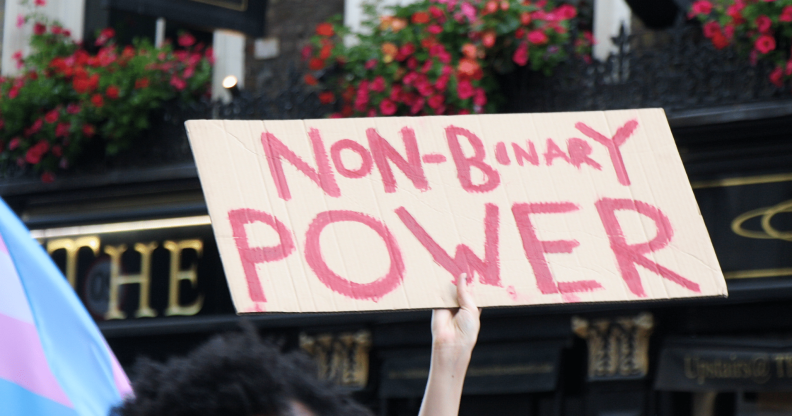Non-binary people have suffered and triumphed this past year. Visibility can only get us so far

A placard reading “Non-binary power” at London Trans+ Pride, 2021. (Charlie Mathers/@charlie.mathers)
This Non-Binary Awareness Week is an opportunity to reflect on the changes, challenges and triumphs of the past year for non-binary people.
It has, in almost every respect, been tough.
In the UK, gender clinic waiting lists grew longer, the Tories refused to legally recognise us, we were excluded from the census and the media continued to ridicule us. This all against the backdrop of a pandemic that cut us off from our communities, handled by a government so inept and callous that hundreds of thousands of people died.
By the only available estimate, non-binary people account for more than half of trans people in the UK, and some of the things that particularly affect us – like ‘X’ gender markers in passports, all-gender or gender-neutral toilet provision, including the prefix ‘Mx‘ anywhere a prefix is needed – have been prominent issues of this year.
However, most of the focus on “transgender issues” in the last year was related to legal gender recognition, healthcare for trans kids and trans women’s access to certain spaces. These issues commonly exclude non-binary people: there is no non-binary legal recognition, NHS healthcare provision for trans kids is talked about in extremely binary terms (though no doubt there are non-binary children accessing those services), and when we talk about sports, prisons, bathrooms and domestic violence refuges we rarely hear about how those spaces include or exclude non-binary people.
We are also usually excluded from data that’s collected on LGBT+ people, so it’s difficult to know what, for example, non-binary unemployment rates are or how many non-binary people are in prison.
But steps are being made by some organisations to address this. One welcome move was when LGBT+ anti-violence charity Galop included non-binary identities in its Transphobic Hate Crime report in November 2020.
But it’s not all doom and gloom.
A landmark ruling against Jaguar Land Rover affirmed that non-binary and genderfluid people are protected from discrimination under the protected characteristic of “gender reassignment” in the Equality Act 2010. Lawyers had long advised that this was the case, but it was nice to have it confirmed in writing.
Another historic court ruling in 2020 offered hope to non-binary asylum seekers when an El Salvador citizen was given asylum in the UK because they would face persecution for their gender identity if returned to El Salvador. The judge expressly ruled that being non-binary can be grounds for an asylum claim.
Debate – both within and outside non-binary communities – continued to be had over whether we want legal recognition of non-binary genders, or the abolition of legal gender altogether. Research from the University of Exeter found that half of trans and non-binary people back getting rid of legal gender categories by ending the practice of recording sex at birth
However, a petition – which garnered almost 130,000 signatures – calling on the government to include non-binary genders within the existing gender recognition framework was firmly rejected by the Tories.
Also in the last year, JK Rowling and Chimamanda Ngozi Adichie continued to explain their views on trans and non-binary people. The less said about them the better.
More positively, the British Medical Association – in the wake of Liz Truss scrapping meaningful Gender Recognition Act reform – backed gender self-determination for trans and non-binary people. It might not mean much for now, but it indicates that progress in some directions has been made.
We also made some progress in terms of political representation: Wales elected the first non-binary mayor in the world, Owen Hurcum, and the US elected its first openly non-binary state lawmaker, Mauree Turner. And Petra de Sutter, the trans deputy prime minister of Belgium, vowed to reform gender recognition laws to bring in legal recognition for non-binary people.
And this week, the UK’s Supreme Court is hearing its first-ever transgender civil rights case. Brought by non-gendered campaigner Christie Elan-Cane, the court’s ruling could pave the way for non-binary people to have ‘X’ gender markers on their passports.
Many celebrities and public figures came out as non-binary in the last year, including Demi Lovato, Hugh Sheridan, Lio Tipton and Shakina Nayfack.
As I’ve written before: “In the UK, life is so impossible for trans people that many are making the difficult choice to leave. The increased visibility we now ‘enjoy’ has directly contributed to worsening transphobia, which underpins both physical violence, online abuse and attacks on our civil rights.”
What might it be like if the energy and attention that’s dedicated to Non-Binary Awareness Week was given over to the fight for non-binary liberation?
As non-binary people, being out and proud is restricted to those of us who can do so in relative safety, and our visibility can only go so far. Awareness can only go so far. But I guess it’s a start.

